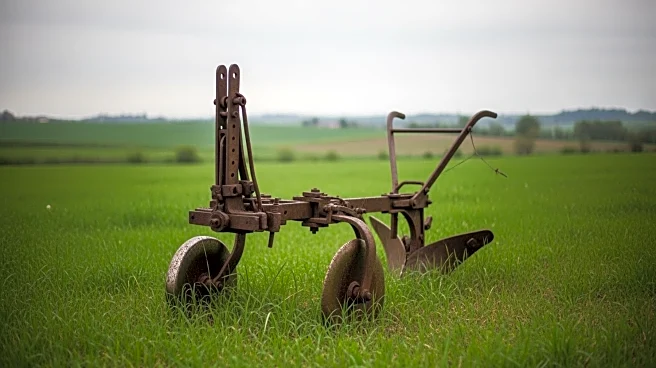What's Happening?
A $500,000 project aimed at modernizing small-scale farming in Haiti has stalled, leaving the developed tools and research unused. Launched in fall 2020 and funded by the Inter-American Development Bank,
the project was part of Haiti's Technological Innovation Program in Agriculture and Agroforestry. It aimed to reduce farmers' workload and boost productivity by developing small-scale agricultural machinery. Despite the completion of the project in September 2024, the tools and research remain locked away in government offices. The project developed five technical packages and ten small-scale farming tools, such as an auger and animal-drawn seeder, designed to be affordable and low-maintenance for Haitian farmers. However, these innovations have not been distributed, and farmers continue to rely on outdated tools.
Why It's Important?
The delay in implementing the agricultural mechanization project highlights the chronic administrative inertia that has hindered Haiti's agricultural modernization. Agriculture is a significant sector in Haiti, employing about 45-50% of the population but contributing less than 20% to the nation's GDP. The lack of modern tools and machinery exacerbates the challenges faced by farmers, including depleted soils and lack of access to credit and irrigation. The project's failure to reach farmers means continued physical strain and low productivity, discouraging youth from engaging in agriculture. This situation underscores the need for effective governance and investment in agricultural innovation to improve food security and economic stability in Haiti.
What's Next?
The tools and research developed under the project are still under analysis by the Ministry of Agriculture, Natural Resources, and Rural Development. There is no specific timeframe for when these tools will be made available to farmers. The delay in implementation could lead to further calls for action from farmers and researchers who emphasize the need for modernization to prevent the decline of Haiti's agricultural sector. The government faces pressure to revive the economy and restore governance, with modernizing agriculture being a critical component of these efforts.
Beyond the Headlines
The stalled project reflects broader issues of governance and investment in Haiti. The country's reliance on imported food makes it vulnerable to global supply shocks and inflation. The successful implementation of the mechanization project could serve as a model for future agricultural innovations, potentially revitalizing the sector and encouraging youth participation. However, without action, the research risks becoming another unutilized report, highlighting the need for a systemic approach to agricultural development.










